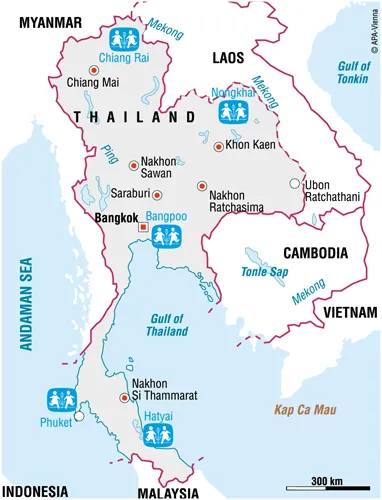
SOS relies on the kindness and generosity of Canadians to be able to provide a home for the most vulnerable children around the world.
By becoming a child sponsor you are helping an individual child in need.
(You will receive a Canadian charitable tax receipt)
Please help us ensure a loving home for every child. Sponsor a child in Thailand now.
SOS Children's Villages in Hatyai
SOS Children’s Village Hatyai tries to strengthen local families by offering day-care for their children at the SOS Kindergarten. For poor families, especially for single parents, it is important to have a place where professionals look after their children. This enables parents to work and earn a living, without having to leave their children unattended.
Children whose families can no longer take care of them can find a loving home in one of the twelve SOS families. The children from the SOS families attend local schools or the SOS Kindergarten together with local children, which helps them become part of the community. This is important for their integration into society when they grow up.
SOS Children's Villages offers special programmes for young adults. They can live together in a house while they attend vocational training or higher education. With the support of qualified counsellors, the young people develop perspectives for their future, learn to shoulder responsibility and increasingly make their own decisions.

Tensions between the Buddhist north and the Muslim south
Hatyai is the most important city in the south of Thailand. It is a large trading centre, with a great deal of cross-border traffic to and from Malaysia. The biggest university of the south is on the outskirts of the city.
2004 saw the end of a relatively quiet period in the southern provinces, which had lasted for more than two decades. Attacks on police posts, schools and military facilities led to an outbreak of violence that cost many lives. The origins of the conflict lie in the complex historical relations between a Buddhist nation and its predominantly Muslim southern provinces. Resentment had been building over years due to the big gap between north and south when it comes to economic development. In addition, people in the south feel they are discriminated against because of their religion
.
Violence has left many children without a father and many families without a breadwinner. Attacks on teachers and schools keep children fro<m receiving their education. In late 2004 all border province schools were closed because of the violence. Teachers and health care providers are reluctant to work in the south, and so access to basic education and health services has become even more limited for the people here. Hard-line crackdowns are said to increase popular support for anti-government groups, especially among young Muslims.
The southern provinces have been affected particularly badly by the economic crisis, with unemployment and poverty soaring to record highs. While the main source of income in the south used to be the fishing industry, with the men going to sea and the women processing the catch, many women now have to work in factories to earn a living. This means that children are often left alone with nobody to look after them during the day.
Families trying to cope with a changing reality
The conflict in the south has aggravated already existing problems. Families have been weakened because both parents have to work outside the home now. Malnutrition and bad hygiene hamper infant growth and development. Child mortality is higher in the south than in the north. Additional problems occur when children become adolescents. Some parents lack the skills to talk to their children about important issues in their lives such as drugs and sexuality, while cultural taboos make it even more difficult to discuss these issues openly.
Those schools that remain open often lack resources and therefore cannot provide good quality education. School achievement in the south lags behind the rest of the country, and there is a sharp drop in school attendance among adolescents because school is not considered relevant to job opportunities. Muslim families prefer religious schools and often do not want their children to attend government-run schools, while Buddhist families living in the south often make their children attend schools in other parts of the country, which has led to the separation of many families.
Our Impact
Image

The SOS Kindergarten in Thailand are a fundamental building block for the early development needs including, intellectual and social skills for children. |
1 KINDERGARTENS | 75 Kindergarten students |
Image
The SOS Children's Village in Thailand provides loving homes to orphaned and abandoned children |
1 VILLAGES | 121 Orphaned and Abandoned Children |
Image
The SOS Youth Facilities in Thailand provides youth with a loving environment where they learn to transition into independent living and to expand their education |
1 YOUTH FACILITIES | 19 Youths in our Care |
Our Impact

